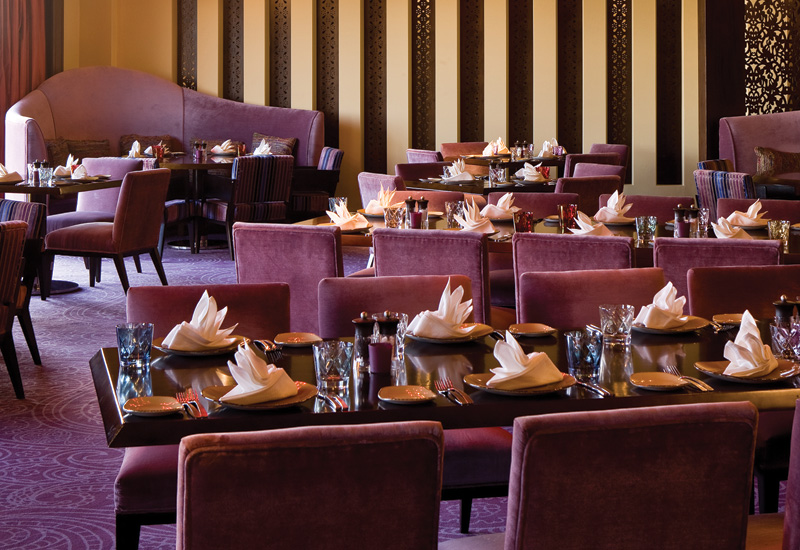 Sofitel Bahrain Zallaq Thalassa Sea and Spa?s Pashawat Restaurant, where Charbel Hanna heads the team.
Sofitel Bahrain Zallaq Thalassa Sea and Spa?s Pashawat Restaurant, where Charbel Hanna heads the team.
World of Opportunity
There has been little effort to bring the more traditional GCC cuisines to the fore, although murmurs do occasionally surface.
Returning to the prevalence of Lebanese food today, Atayeb restaurant’s Al Zaham claims the answer lies in history.
“Lebanese people were the first Arabs to venture out in the wide world from the Levantine region, and spread the experience of their cuisine,” he rationalises.

| Advertisement |
“So it’s understandable that their dishes became famous before any other cuisine from the Levantine region, or any other Arab country, had a chance to flourish.
“And in my view, the most undervalued cuisine here in the Middle East is Iraqi,” he continues. “I have yet to find a truly authentic Iraqi restaurant.”
Over the past 20 years or so, as the world has opened up for international travel, attitudes towards ‘foreign food’ have changed – with Arabic flavours winning over a growing international fan base.
Hanna notes that “Arabs are very well known for their generosity and hospitality, which has impacted directly on their food in terms of variety, presentation and taste.
“This has helped the local cuisine position itself very strongly,” he emphasises.
Al Zaham adds that he’s seen a big change in orders by guests over the past three years: “When I opened, there was only demand for the grilled meat main course, and maybe one specific mezzah. But in the last 18 months, the guests have gradually started demanding more of the different options.”
Korooni asserts that today, Arabic cuisine is well known the world over – from Lebanese shawarma to Turkish baklava. He says that more modern serving styles and presentation has had a lot to do with winning over the international market.
At Zaatar w Zeit, Cravia’s Halloway says they’ve seen the demographic broadening. “Now we don’t only see Arab visitors, but also a lot of expats, seeking healthy, fresh alternatives to traditional fast food,” she says.
So the cuisine is well-established, and well represented: but just how tough is it to compete in the Arabic arena?
According to Al Nafoorah’s Hussain, the stakes are rising day by day.
“That’s a good thing, because it gives guests the opportunity to choose between a selection of restaurants that offer great value for money,” he says. “Once you’re competing on that level, the challenge is to find a balance between the quality of food, service and atmosphere that gives you the edge.”
Heritage
Staffing has always been a hot topic in the regional F&B field and finding chefs of regional descent has generally not been easy. However, Al Nafoorah’s Hussain insists there is an increasing supply of Arabic chefs, with a “good knowledge and background.”
Other chefs maintain that more needs to be done to attract GCC nationals into the F&B field, and particularly when it comes down to the kitchen. In last month's Caterer's Head Chef Survey, 75% of chefs agreed or strongly agreed they would like to recruit more national born staff.
“There are always new hotels and restaurants opening in the Middle East,” says Rosewood’s Korooni. “Many of them will want to offer a locally flavoured restaurant of some kind, so chefs who know and understand the region’s cuisine, because they have grown up here, are in demand.”
Atayeb’s Al Zaham adds that it is getting tougher to recruit Arab chefs, and puts this down to the Arab Spring, and ongoing “political instability in the region.”
Still, it seems those working in the field today are doing well – with many branching out and exploring new innovations to spice up the time-honoured classics.
In Saudi Arabia, however, Rosewood’s Korooni is admiring a trend that he’s witnessing in the country today.
“Growing numbers of ladies are entering the food and beverage industry. Not to cook at hotels, as such, but preparing and selling local delicacies. It’s a wonderful way to keep really authentic, traditional local dishes alive,” he asserts.
Altayeb’s Al Zaham says he’s noticed a growing industry buzz around going back to the roots of Arabic cuisine, by eating “locally-sourced organic food with less processing and more flavours.”
Despite this encouragingly fresh thinking, Arabic restaurants can easily become a cliché, in terms of menu, décor and entertainment; how can an outlet ensure it stands out from the crowd, amidst so much tradition?
Al Nafoorah's Hussain believes it’s about focusing on six main points: “Quality and variety of food; ambience; service; location; value for money; and entertainment.”
Cravia’s Halloway adds that it is vital to keep the food and concept offering fresh.
“The key is to continually enhance the menu and give new tastes and deals that stand out from the rest. And in addition to food itself, it’s important to remodel the brand image as to stay relevant, yet as unique as possible,” she explains.
The main issue that chefs working in Arabic cuisine seem to agree on is that authenticity is a must.
But as Sofitel Bahrain’s Hanna puts it: “It’s what you do on top of that to make sure your food – and outlet – stands out and is remembered, that’s the important part.”








 Search our database of more than 2,700 industry companies
Search our database of more than 2,700 industry companies









